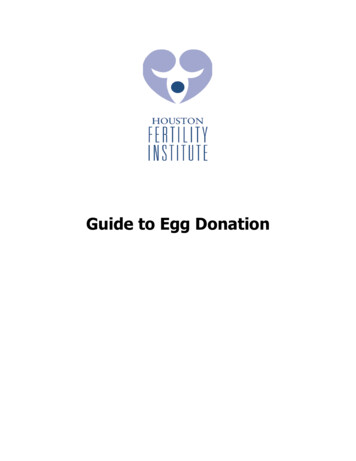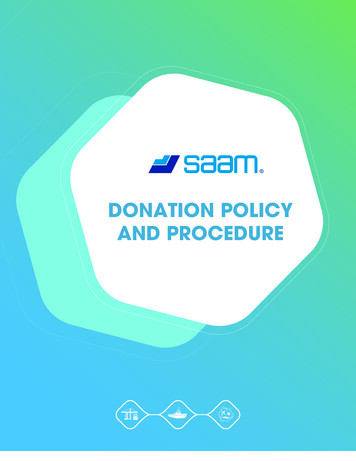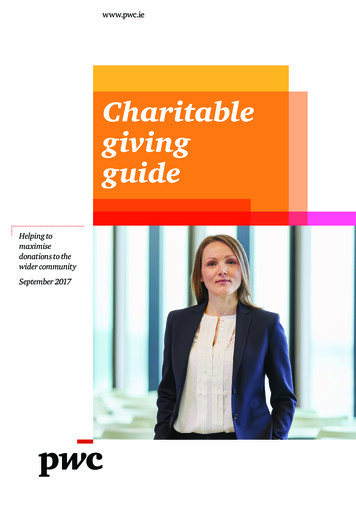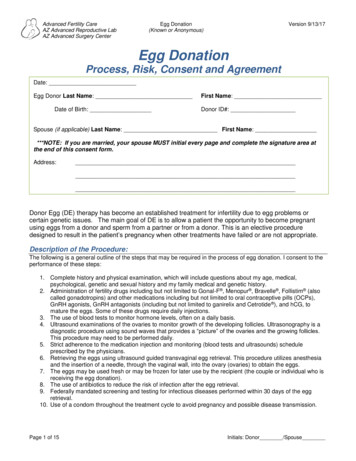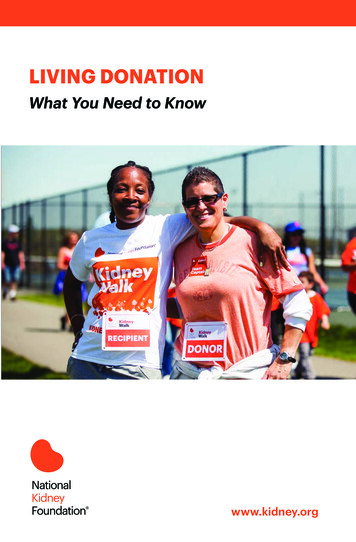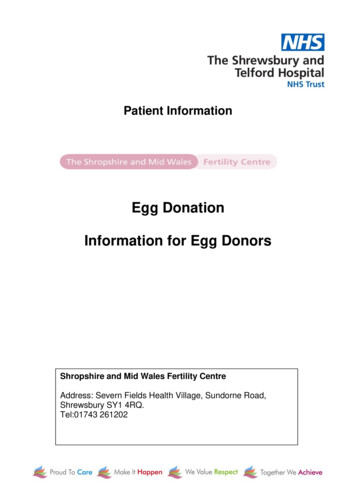
Transcription
Patient InformationEgg DonationInformation for Egg DonorsShropshire and Mid Wales Fertility CentreAddress: Severn Fields Health Village, Sundorne Road,Shrewsbury SY1 4RQ.Tel:01743 261202
IntroductionThis leaflet has been designed to help those who are considering donating their eggs to help otherwomen who are unable to produce or use their own.If you have any further questions about donating your eggs, please feel free to speak to a member ofthe nursing team at the Fertility Centre (Tel: 01743 261202).Why is egg donation needed?Some women find it is impossible or extremely difficult to achieve a pregnancy using their own eggs.This can be due to them having low numbers of eggs remaining, poor quality eggs or certain medicalconditions.These conditions include: Premature menopause (usually classed as menopause before the age of 40)Poor response to ovarian stimulation at previous attempts at assisted conceptionInfertility caused by the removal of both ovaries or from chemo/radiotherapy treatment.Inherited disorders in the family of the female partnerWomen and couples who find themselves in this situation will be advised to consider egg donationas a possible treatment option. Eggs donated by another woman (known as the “donor”) arefertilised in the laboratory using the patient’s partner’s sperm or donor sperm in a process known asIn-Vitro Fertilisation (IVF). Embryos created using this process are transferred back into the patient,(known as the “recipient”) who will hopefully go on to achieve a pregnancy and give birth to a baby.Donors may be known to the patient or may be anonymous.Egg donation and the lawAny child born as a result of an egg donation treatment will be the legal child of the recipient, not thedonor. The Human Fertilisation and Embryology Authority (HFEA) keeps a register of all egg andsperm donors as well as all treatments using donated eggs or sperm.The donor will not have any obligations towards such children and the couple being treated will still bethe legal parents.Egg donors are anonymous from the patients who receive their eggs. A donor will not know theidentity of the patients who receive their eggs and recipients of the eggs will not know the identity ofthe donor.Patients receiving donated eggs are given information on the characteristics of the donor such as eyecolour, hair colour, height, BMI, ethnic origin, blood group etc and non-identifiable information aboutyourself that you may provide.The identity of egg donors who donate anonymously will only be known to Centre staff and the HumanFertilisation & Embryology Authority (HFEA). Any child born as a result of donor egg treatment willhave the right to contact the HFEA at the age of 16 at which time they will be entitled to receive thefollowing non-identifying information: Physical description (height, weight, eye hair and skin colours)Year and Country of birthEthnic groupWhether the donor had any genetic children when they registered and the number and sex ofthose childrenThe number, gender and year of birth of any half/full siblings they may have
Other details you the donor may have chosen to supply (e.g. occupation, (religion) beliefsystems and interests)Ethnic group(s) of the donor’s parentsWhether the donor was adopted or donor conceived (if they are aware of this)Marital status (at the time of donation)Details of any screening tests and medical historySkillsReason for donatingA goodwill messageA description of themselves as a person (pen portrait)Any child born as a result of donor egg treatment will have the right to contact the HFEA at the age of18 at which time they will be entitled to receive identifying information (after appropriate counsellingand notification of yourself) which will include: Donors full name (and any previous names) Date of birth and town or district where born Last known postal address (or address at time of registration) Donors have the right to access by law information about the number, gender and year of birth of anychildren born as a result of their donation. This information is currently available to donors as adiscretionary right from the Authority.Donors are strongly encouraged to inform the fertility unit and HFEA of any change of contact details.This is so that you can be informed if anyone requests your disclosable information in future. We shallattempt to contact you should we become aware that a request for your identifiable information hasbeen made. Counselling is available on request.Are there other ways donors can be identified?Yes. Although the fertility clinic and HFEA will continue to manage (and potentially disclose) thedonor’s information in line with the HFE Act donors and recipients need to be aware that it is possiblefor them to be identified through direct to consumer DNA testing matching services e.g. 23 and meand that this is outside of the control of both the clinic and the HFEA. It may be possible for those notregistered with a consumer DNA matching company to be traced through genetic relatives that areregistered.Donor ScreeningAfter a woman has been counselled and accepted as a potential donor she must undergo a‘screening’ programme. This is done to ensure that she has no infections or genetic conditions thatmight be passed on to the recipient or her child.We will take a medical, family and travel history. A general examination is performed by a doctor at thetime of the pelvic ultrasound scan. We will also ask for the donor’s permission to contact her GP for amore detailed medical history.The donor must provide blood samples to determine whether they have any infections such ashepatitis B core antibody, Hep B surface antigen & HEP C, syphilis, HIV 1&2, Cytomegalovirus (CMV)& HTLV 1&2 and their Chromosomes and Cystic Fibrosis status checked. The donor will also have aurine sample to test for Gonorrhea and Chlamydia.Jews of eastern European descent should be screened for Tay-Sachs, people of Indian,Mediterranean and Middle-Eastern descent should be screened for β Thallassaemia and people ofAfrican descent should be screened for sickle cell.
However, the screening process is not a guarantee that any child born would be healthy and free fromgenetic disease or that the donor is free from all infectious diseasePlease consider the implication of the genetic and medical screening you will undertake and how thiscould affect you and any family you have if you receive any unexpected results. The implications ofbeing tested for HIV 1&2 are discussed with the patient prior to the test being taken. The results of thetests are confidential and are only made known to the donor. Without her written permission her GPcannot even be informed.All egg donors are required to have repeat screening three months after their egg donation and beforea recipient goes on to have treatment using frozen embryos/blastocysts from that donation.What treatment is involved for the donor?An egg donor will basically receive the same treatment as a patient undergoing IVF, with the maindifference being that the donor will not have any embryos replaced in her uterus.Treatment involves medication to “switch off” the ovaries followed by other medication to stimulatethem to produce more eggs. The doctor will decide which protocol of medication best suits you. Duringthis time we will need to perform 3-5 trans-vaginal ultrasound scans and blood tests to determine thegrowth of the follicles which will contain the eggs.The egg collection is performed under conscious intravenous sedation and pain relief. If you are ananonymous donor is used, the eggs are divided equally between two recipient couples.We ensure that the recipient of the eggs and her partner (if she has one) are carefully counselled andthat the rights of the unborn child conceived using egg donation are carefully considered.Matching the Donor to the Recipient – in anonymous donationAs far as possible we try to match the general physical characteristics of the donor to those of therecipient. The characteristics we try to match are: HeightWeightBuildHair colourEye colourCMV status (presence of Cytomegalovirus antibodies in the blood)ComplexionEthnic BackgroundWe always attempt to match blood group. It is not always possible to get an exact match, but we tryour best to get it as close as possible.Will I have to pay to donate?No. All medical expenses will be covered by the recipient or by the NHS.Do I Get Paid to Donate?From 1st April 2012, the donor can be compensated up to 750 to cover expenses and loss ofearnings with the provision to claim an excess to cover higher expenses if the centre feels that it is a
reasonable. The centre may only provide excess expenses (such as travel, accommodation orchildcare) which are reasonable; do not include loss of earnings; have been incurred by the donor inconnection with the donation of gametes provided to the centre' and have been incurred by the donorsolely within the United Kingdom. The centre is required to keep a record of the actual excessexpenses incurred, a record of the amount reimbursed and all receipts produced by the donor linkedto the donation.Will I be held responsible if a child born from my donation is disabled in any way?It is the responsibility of the donor to inform us of any genetic (inheritable) diseases that are known inthe family. It is essential that the Centre is informed of any such conditions as if it can be proven thatthe donor has knowingly misled the Centre and the recipient then the parents of any child born as aresult of treatment that is affected could sue the donor for damages.Should you become aware of any genetic or medical problems after you have donated you have aduty to inform the fertility clinic of this as it may have implications for the woman you have donatedeggs to and any resulting children.How many times can a donor donate?There is no theoretical limit to the number of times a woman might donate her eggs, however everydonor has a limit of 10 family units if each achieve a pregnancy. Once a couple have had a baby withdonated eggs they may have as many ‘sibling’ children using the same donor eggs as they wish,either by using embryos frozen in previous cycles or, fresh donor eggs if the donor is willing to gothrough another egg collection.The ten family units limit makes it absolutely essential that you inform the Centre if you have donatedeggs in the past at other Centres.Who can donate and how are donors selected?Donors must be 35 years or younger and can come from one of two categories: ‘Anonymous’ volunteer donorThis is perhaps the best way to obtain donor eggs. Donors undergo the procedure voluntarily and forpurely altruistic reasons. Expenses incurred by the donor (e.g. transport and loss of earnings) up tothe value of 750 are reimbursed. Close relative or friendSome patients, either for ethnic, cultural or religious reasons and others out of personal preference,choose to have a ‘known donor’, such as a sister or friend of the female partner.Donor CounsellingAll volunteers for egg donation are carefully counselled by two separate members of the FertilityCentre team and are also seen by the independent counsellor. The effects of the procedure on thedonor, her family and children are discussed in detail. The Centre also ensures that if the donor has apartner they participate fully and agree with the treatment.If the donor has children who are old enough to understand the implications, we encourage her todiscuss it with them also.Confidentiality is maintained at all times, both for the donor and the recipient and the Centre will notinform the donor of the outcome of the donation. Obviously a known donor would be informed by therecipient couple.
Can I find out about the outcome of my donation?A year following the donation the donor may ask the centre for the following information if they wish: The number of children born as a result of the donation The gender of the children born as a result of the donation The year of birth of the children.The risks to the donorThere are some risks associated with donation but these are small and short term. There is a 1-2%risk of excessive ovarian stimulation (where too many eggs are produced) despite careful monitoringof injections. This is called Ovarian Hyperstimulation Syndrome (OHSS) and information about this willbe available separately. If this occurs the cycle may be abandoned.There is a small risk of pelvic infection following an egg collection (less than 1%).What should I do if I wish to donate?You can contact the nursing staff at the Fertility centre (Tel: 01743 261202) to arrange an appointmentor for an informal chat 9am to 5pm Monday to Friday.If you wish to know more about the drugs involved and the egg collection procedure itself please visitour website www.shropshireivf.nhs.uk .The Importance of Telling Children About Their Donor-conceived OriginsCentres are now required by law to give patients undergoing treatment using donor gametes (eggs orsperm) or embryos information about the importance of telling any resulting child at an early age thatthey are donor-conceived. Centres are also obliged to inform patients about suitable methods fordoing so.What happens if I change my mind?You can withdraw your consent to the egg donation at any time (until the eggs have been used),without fear of financial penalty or recrimination. Once donated you can vary or withdraw consent upuntil the eggs/embryos have been used in treatment.What happens if the fertility unit think I am unsuitable to donate?On occasion the fertility unit may consider someone unsuitable for donating eggs, for examplebecause of your health. This will have been discussed at a multidisciplinary meeting, taking intoaccount current equality legislation, before making this decision and we will let you know the reasonswhy. If you are considered unsuitable to donate you will be offered counselling.Contacting the CentreYou can contact the centre at any time if you have any worries, concerns or questions about yourtreatment.The staff are available on the following number 01743 261202 option 2 Monday—Friday from 9am—5pm.
Other Sources of InformationReferencesHFEAwww.hfea.gov.ukDonor Conception Networkwww.dcnetwork.orgThe Seed Trustwww.seedtrust.org.ukContact details for more informationUseful telephone numbersFertility nursing team 01743 261202 option 2 or call the hospital switchboard on 01743261000 and ask to be put through to the Fertility unit. Please note the department acceptscalls from 9am to 5pm Monday to Friday.Further information is available from;Patient Advice and Liaison Service (PALS)We act on your behalf when handling patient and family concerns, liaising with staff,managers and where appropriate, relevant organisations to negotiate immediate or promptsolutions. We can also help you get support from other local or national agencies.Royal Shrewsbury Hospital, Tel: 0800 783 0057 or 01743 261691Princess Royal Hospital, Tel: 01952 282888Other Sources of InformationNHS 111A fast and easy way to get the right help, whatever the time. NHS 111 is available 24hours a day, 365 days of the year.Telephone: 111 (free from a landline or mobile)Website: www.nhs.ukPatient UKProvides leaflets on health and disease translated into 11 other languages as well aslinks to national support/self-help groups and a directory of UK health websites.Website: www.patient.infoInformation in other Formats
Please contact the Fertility Unit to discuss of you need this information in another format ordifferent language.Website: www.sath.nhs.ukwww.shropshireivf.nhs.ukInformation Produced by: The Shropshire and Mid Wales Fertility CentreDate of Publication: 3/5/2021Due for Review on: 3/5/2022Document Number A86C v12 SaTH NHS Trust
Egg donation and the law Any child born as a result of an egg donation treatment will be the legal child of the recipient, not the donor. The Human Fertilisation and Embryology Authority (HFEA) keeps a register of all egg and sperm donors as well as all treatments using donated eggs or sperm.
